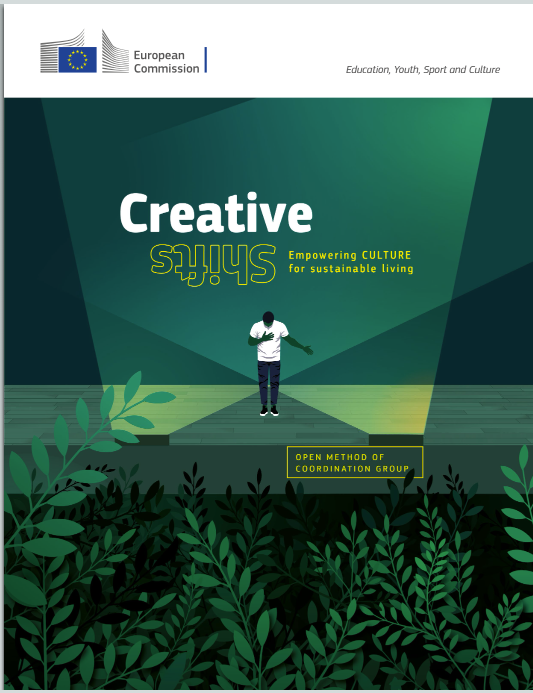
Täna võttis komisjon vastu 2022. aasta tööprogrammi, millele järgneb uute taotlusvoorude avaldamine. Programmi eelarve on pea 100 miljonit eurot suurem kui 2021. aastal – ligi 385 miljonit eurot. See võimaldab suurendada programmi toetust loome- ja kultuuripartneritele, võttes arvesse COVID-19 kriisist ja kasvavast üleilmsest konkurentsist tulenevaid väljakutseid.
Innovatsiooni, teaduse, kultuuri, hariduse ja noorte volinik Mariya Gabriel sõnas: "Kultuuri- ja loomesektorid on Euroopa hing. Me teame, kui vastupidavad nad on olnud viimasel kahel aastal. 2022. aastal on Loov Euroopa eelarve kõigi aegade suurim. EL toetab nende sektorite taastumist, loometegevust ja innovatsiooni. Kutsume kunstnikke, loojaid ja kultuuritöötajaid üles uurima ja kasutama programmi pakutavaid rahastamisvõimalusi.“
Siseturuvolinik Thierry Breton lisas: „2022. aastal suurendame toetust pandeemiast räsitud Euroopa kultuuri- ja loomesektorile, kinodest festivalideni. Programmist „Loov Euroopa“ eraldame rekordilised 226 miljonit eurot audiovisuaalvaldkonnale ja 35 miljonit eurot sektoriüleseks koostööks, sealhulgas uudismeediale. Loov Euroopa investeerib digitehnoloogia ja uut liiki sisu innovatsiooni, alates tipptasemel telesarjadest kuni virtuaalreaalsuseni. Meediavabaduse kaitsmiseks rahastame ajakirjanike koostööd, tugevdame kutsestandardeid ja edendame meediapädevust.“
Programmi kultuuri alaprogramm hõlmab uusi toetusskeeme ja algatusi muusika, kultuuripärandi, etenduskunsti ja kirjanduse valdkonnas. Lisaks pakutakse kunstnikele, loovisikutele ja kultuuritöötajatele võimalusi minna välismaale, et end kutsealaselt täiendada või osaleda rahvusvahelises koostöös ning leida uut publikut, kaastoota, koosluua või tutvustada oma tööd.
MEDIA alaprogramm keskendub audiovisuaalvaldkonnale ja 2022. aastal on oodata mitut uuendust. Hakatakse rahastama uuenduslike videomängude ja virtuaalreaalsuse arendamist. Uus meede „MEDIA 360 kraadi“ on mõeldud juhtivatele ettevõtlusfoorumitele, mis teevad koostööd ettevõtetega kogu audiovisuaalse väärtusahela ulatuses. Innovatsiooni soodustamiseks käivitatakse paljutõotavate idufirmade jaoks meediaturu portaal. Koostööd filmifestivalide vahel tugevdatakse võrgustike kaudu.
Sektoriülese suuna abil suurendatakse loova innovatsiooni labori rahastamist mitut loomesektorit hõlmavate innovatsiooniprojektide rakendamiseks. Sellega toetatakse ka uue Euroopa Bauhausi algatust. Samuti laiendatakse toetust uudistemeediale, võttes lisameetmeid meediavabaduse kaitseks.
Programmiga „Loov Euroopa“ püütakse lahendada ka muid kultuuri- ja loomesektoreid mõjutavaid küsimusi. Meediasuunast raha saamiseks peab projekt hõlmama strateegiat keskkonnahoidlikkuse ja mitmekesisuse, sealhulgas soolise tasakaalu suurendamiseks. Programm toetab seega märkimisväärselt komisjoni poliitilisi prioriteete kestlikkuse ja kaasamise valdkonnas. Programm sisaldab algatusi, mis katavad ka muid ELi prioriteete. Näiteks panustatakse nii antisemitismiga võitlemise ja juudi eluviisi edendamise strateegiasse kui ka Euroopa noorteaastasse.
Kultuuri- ja loomesektoreid kutsutakse üles tutvuma hiljuti koostatud veebijuhendiga CulturEU, mis annab ülevaate kõigist neile pakutavatest ELi rahastamisvõimalustest. Interaktiivsel veebisaidil on kirjeldatud kokku 75 rahastamisvõimalust 21 ELi programmist, alates programmidest „Loov Euroopa“ ja „Euroopa horisont“ kuni struktuurifondide ja InvestEUni välja.
Taust
Kultuuri- ja loomesektoritel on alati olnud Euroopa elu rikastav mõõde, mis suurendab Euroopa sotsiaalset ühtekuuluvust ja mitmekesisust, aga mõjutab ka ELi majandust – kogu ELi SKPst moodustavad need sektorid 4,2% ja ELi tööjõust 3,7%.
Loova Euroopa kogueelarve aastateks 2021–2027 on ligikaudu 2,4 miljardit eurot, mis on 63% rohkem kui 2014.–2020. aastal. Suurem eelarve kajastab Euroopa Liidu võetud kohustust aidata sektoril lähiaastatel taastuda ja suurendada selle vastupanuvõimet. Programmil on kolm tegevussuunda:
- kultuurisuund katab kõiki kultuuri- ja loomesektori valdkondi, välja arvatud audiovisuaal- ja uudistemeedia;
- meediasuuna alt toetatakse audiovisuaal- ja filmisektorit;
- sektoriülene suund on mõeldud sektoriülese koostöö tugevdamiseks.
Loomesektorites tegutsevad avaliku ja erasektori asutused saavad rahastuse taotlemisel abi Loova Euroopa teabepunktidest, mis asuvad kõigis ELi liikmesriikides ja programmiga ühinenud kolmandates riikides.
Täpsemat infot konkreetsete meetmete ja taotluste esitamise tähtaegade kohta leiab siit.
Jaga
Taotlusvoorud
.jpg)




.png)
.jpg)